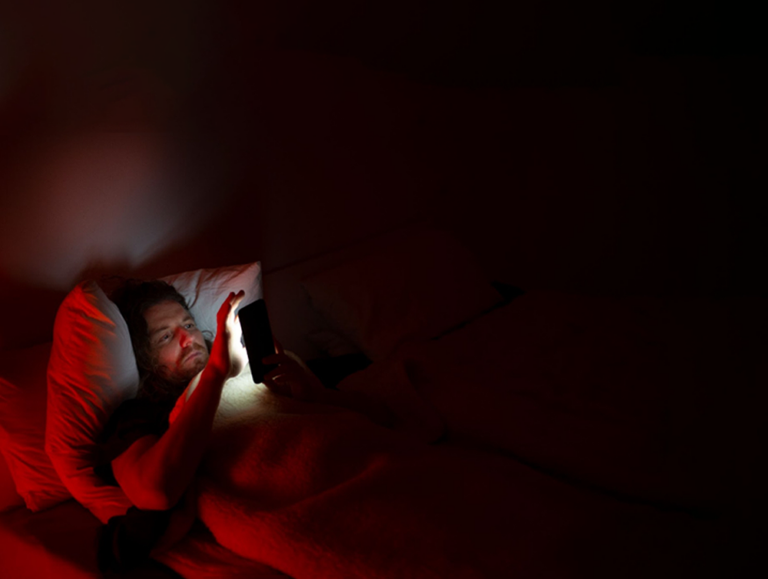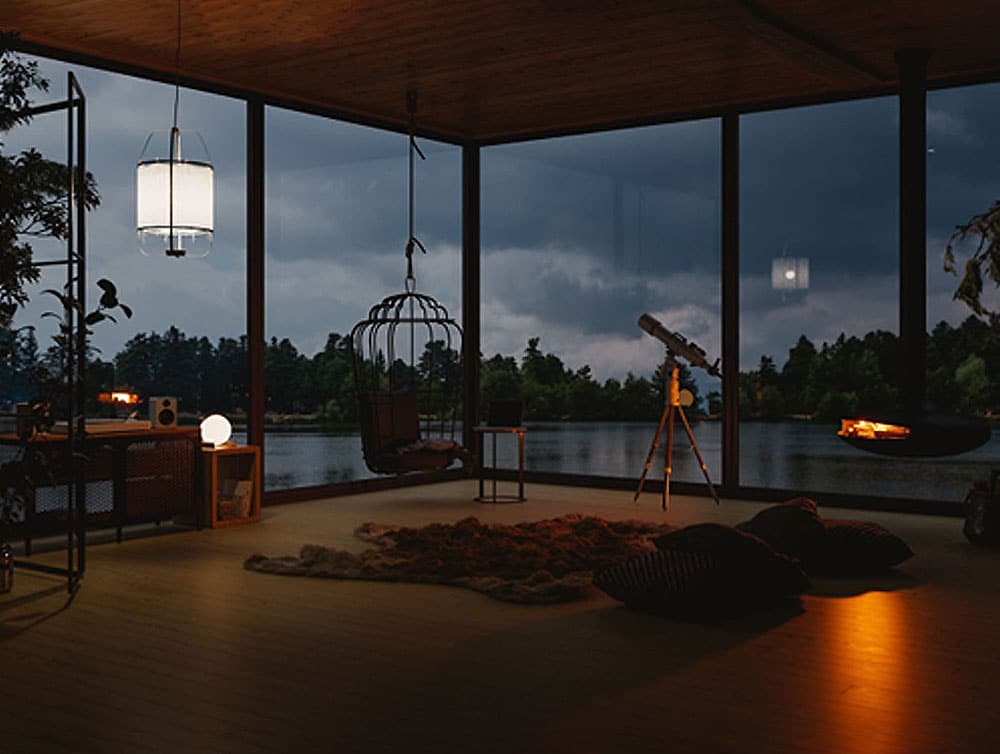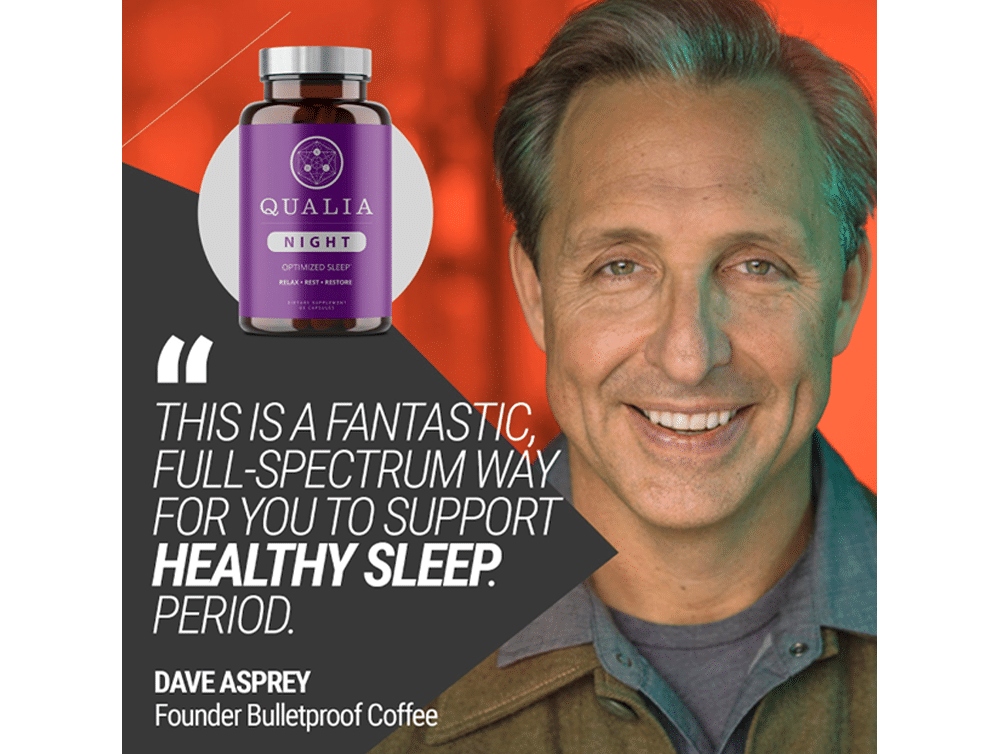
Did you know 70% of Americans are now reporting poor sleep on a regular basis[1]?
70% – that’s an insane number. How are we supposed to wake up and own the day when we can’t even shut down and sleep at night?
I’m sure past generations had their fair share of restless nights, but sleep issues today have reached the point of a true national health crisis. Why are we struggling so much to catch z’s these days? The answer is complex, but one of the reasons is a huge blind spot for most people, and it may surprise you.
But let’s not get ahead of ourselves. Before we dive into precisely why you’re tossing and turning your nights away, here’s why you should care.
Research studies have linked chronic poor sleep to[2][3][4][5][6]:
- Poor weight control.
- Cardiovascular issues
- Immune imbalances.
- Low mood.
- Lower cognitive performance
- And more
You get the idea. If you want good health, you need good sleep.
Okay, okay, now don’t stress that your sleep is ruining your life and health. Just keep reading; I’m about to go over three virtually effortless things you can do to promote far better sleep quality.* And yes, we’re going to address that blind spot too, because once I knew what I was missing, it absolutely transformed the quality of my sleep.*†
To start, let’s go over why our generation is getting such awful sleep in the first place.
Modern Times Work Against Healthy Sleep Habits.
For hundreds of thousands of years, we evolved to base our sleep schedule on the rise and fall of the sun.
In fact, it wasn’t until 1925 (less than 100 years ago) that most American households acquired electricity.
And while electricity may have been the beginning of separating our sleep schedules from the sun, in the last 20 years, things have gone from bad to worse.
Nowadays, we’re blasting our eyes with sleep-destroying blue light from TVs, laptops, and smartphones right up until the time our heads hit the pillow.
I know what you’re thinking, and you’re right; it’s hard to stop a Netflix binge or tune out the siren song of your phone at night – but here’s why you should care; studies repeatedly show that excessive blue light exposure suppresses the critical “sleep hormone” melatonin[7].
Unfortunately, modern times have made us addicted to our devices, and how could we not be? We live in a world of FOMO (fear of missing out), with news breaking 24/7 and everyone we know posting new information at all hours on social media.
Our grandparents weren’t constantly tempted by digital screens designed to hold their attention by any means necessary.
And if all that blue light and media content isn’t enough to keep you up at night, we have the current state of the world. If you haven’t noticed, the 2020’s have been…well…a lot.
Socially isolating lockdowns, the worst political division of our lifetime, and superpowers pushing military tension to the brink (just to name a few less-than-relaxing realities of late).
So if your sleep sucks, welcome to the club. For all the reasons I listed (and many more), great sleep for our generation takes an actual plan.
But the good news is how easy it can be to rapidly change your sleep quality once you know where to start.
3 Easy Steps To Unlock Great Sleep Night After Night:
#1- When The Sun Goes Down, So Should Your Lighting.
Until about 100 years ago, our species had evolved to use decreasing light brightness as a queue for our sleep-wake cycle. There was some light (the moon, the stars, firelight, etc.), but nothing like the average American home interior these days at 10 pm.
So if you want to sleep like your ancestors, when the sun goes down, ease your indoor lighting to become very mild. This helps to more closely mimic the lighting transition we’ve evolved to recognize as the queue for the sleep phase of our sleep-wake cycle.
And something you can do as a permanent change as soon as you’re done reading this article is to lower the brightness level on your laptop and phone. They’re almost always far brighter than necessary. For bonus points, try avoiding them altogether within a couple of hours of sleep, or at least the final hour before you hit the hay.
#2- Shift Your Body Temperature Into A Sleep-Inducing Sweet Spot.
Throughout a 24-hour period, your core body temperature slightly fluctuates. And when your core body temperature is at a low point (1 to 2 degrees Fahrenheit below average), that typically correlates with periods of sleepiness[8].
But did you know you can actually induce a slightly lower core body temperature, thereby making you more conducive to sleepiness?
The trick is to do something just before bed that actually raises the temperature around you (such as a sauna, hot tub, or hot shower). This makes your body try to counteract the external heat increase by decreasing your core body temperature.
So a daily sauna or even a simple hot shower shortly before bed can do wonders for sleep.
#3- Get Yourself Some Sleep-Enhancing Nutrients – They’re A Life Changer.
Okay, here it is; this is by far the biggest blind spot I see in achieving better sleep; you need more sleep-inducing nutrients.
Did you even know “sleep-enhancing nutrients” were a thing?
Most people don’t, but the science of certain ingredients is impressive.
To be clear, I’m not talking about “sleeping pills” or medication. I’m talking about a more natural approach with vegan, non-GMO, gluten-free ingredients that are research-backed to promote amazing sleep quality.*
- The most well-known of these sleep nutrients is magnesium. It supports normal signaling of “the sleep hormone” melatonin that can become depleted from blue light exposure. A lot of people supplement with melatonin directly. But supporting your own body to produce normal melatonin levels with magnesium is a way more holistic approach[9].
- The herb gotu kola is research-backed for promoting relaxation. I love this herb because it doesn’t make you “sleepy” per se; it just helps take the edge off and make the transition from awake to asleep feel subtle and smooth[10].*
- Holy basil leaf extract supports healthy stress regulation to quiet an overactive mind (that keeps you up half the night). This is a great ingredient if you tend to enter “worry mode” as soon as you lay down, unable to mentally transition to sleep[11].*
- And white peony root extract supports the steadiness of your sleep cycle once you’re actually asleep. This is HUGE. Restorative sleep is about quality every bit as much as quantity. Even if you lay in bed 8 hours a night when you’re tossing and turning and rarely entering deep sleep and REM, you wake up feeling like you got three hours of sleep. This ingredient is all about promoting sleep quality[12].*
In addition to those gems, there are dozens of ingredients shown in studies to support the human sleep cycle in dynamic ways.*
One option would be to try a handful of ingredients and see which ones work – but, honestly, who has time for that? Furthermore, most people benefit from the synergy of sleep-supportive nutrients, which is why I like to go for a sleep product that contains a smattering of ingredients.
Personally, a sleep-enhancing formula that blew me away is Qualia Night. It contains every ingredient I just listed above (+21 more) in the most complete (and clean) sleep-enhancement stack on the market.*
Qualia Night is non-sedating, so it won’t “knock you out.”
Just take it a few hours before bed, and you should find yourself slowly easing into a mellow and restful state by bedtime, followed by effortless restorative sleep and the most refreshed mornings of your life.*
To get technical for a moment, Qualia Night is designed to do all of the following*:
Support natural melatonin production.
- Promote healthy GABA activity.
- Support antioxidant defenses.
- Provide adaptogen support.
- Balance cortisol levels.
- Support gut microbiome health.
- Enhance the function of BDNF(brain-derived neurotrophic factor).
Personally, I barely notice Qualia Night in the evenings – when I really notice it is in the mornings.
Since I’ve added Qualia Night to my diet, I’m routinely waking up before my alarm goes off feeling fully recharged, in a great mood, and ready to hit the ground running (instead of peeling myself off the mattress while trying to fight the temptation of a few snooze buttons).*†
And now’s the best time ever to try Qualia Night because (for a limited time) it’s available at 50% off for a month’s supply, backed by a 100-day, 100% money-back guarantee.
Click here to try Qualia Night at 50% off and begin experiencing the most refreshed and recharged mornings of your life. Use code DAVE at checkout for an extra 15% off.
Final Thought: The Great Sleep – Great Life Connection.
If the potential health consequences of poor sleep aren’t enough to make you start taking it as seriously as you should, then let me just point out some benefits that proper sleep can bring to your life.
- Great sleep can transform work performance in your career.
- It can allow you to show up in relationships with presence and love.
- It gives you the energy to appreciate the beauty of the world around you.
Let’s face it. Nothing about us is at our best when we’re exhausted.
And even though our generation is dealing with sleep challenges in new and frustrating ways, we luckily also have amazing new tools to improve our sleep game, such as:
- More sleep health information than ever at our fingertips.
- Holistic sleep enhancement formulas that work amazingly well.*
- And, of course, sleep apps that can monitor our progress in real-time.
So instead of mornings being a source of dread, let’s start enjoying getting up and going through our days as the fully charged version of ourselves.
. *These statements have not been evaluated by the Food and Drug Administration. This product is not intended to diagnose, cure, or prevent any disease.
†Disclaimer: This review represents the personal experience and opinions of the author, and is not a guarantee, promise, or reflection of other users’ results. The author was provided [free product/compensation] in exchange for this endorsement.
References
- https://www.sleepassociation.org/about-sleep/sleep-statistics/
- Grandner, Michael A., et al. “Sleep disturbance is associated with cardiovascular and metabolic disorders.” Journal of sleep research 21.4 (2012): 427-433.
- Besedovsky, Luciana, Tanja Lange, and Monika Haack. “The sleep-immune crosstalk in health and disease.” Physiological reviews (2019).
- Cappuccio, Francesco P., et al. “Sleep duration and all-cause mortality: a systematic review and meta-analysis of prospective studies.” Sleep 33.5 (2010): 585-592.
- Goldstein, Andrea N., and Matthew P. Walker. “The role of sleep in emotional brain function.” Annual review of clinical psychology 10 (2014): 679-708.
- Killgore, William DS. “Effects of sleep deprivation on cognition.” Progress in brain research 185 (2010): 105-129.
- Kimberly, Burkhart, and Phelps James R. “Amber lenses to block blue light and improve sleep: a randomized trial.” Chronobiology international 26.8 (2009): 1602-1612.
- VanSomeren, Eus JW. “More than a marker: interaction between the circadian regulation of temperature and sleep, age-related changes, and treatment possibilities.” Chronobiology international 17.3 (2000): 313-354.
- Abbasi, Behnood, et al. “The effect of magnesium supplementation on primary insomnia in elderly: A double-blind placebo-controlled clinical trial.” Journal of research in medical sciences: the official journal of Isfahan University of Medical Sciences 17.12 (2012): 1161.
- Bradwejn, Jacques, et al. “A double-blind, placebo-controlled study on the effects of Gotu Kola (Centella asiatica) on acoustic startle response in healthy subjects.” Journal of clinical psychopharmacology 20.6 (2000): 680-684.
- Saxena, Ram Chandra, et al. “Efficacy of an extract of ocimum tenuiflorum (OciBest) in the management of general stress: A double-blind, placebo-controlled study.” Evidence-based Complementary and Alternative Medicine 2012 (2012).
- Henderson, Fiona, et al. “Effects of social defeat stress on sleep in mice.” Frontiers in behavioral neuroscience 11 (2017): 227.













